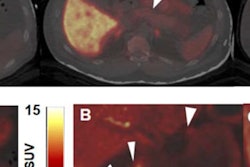PET scans of normal older adults can detect which ones are likely to decline cognitively at a faster rate based on levels of amyloid and other risk factors, according to a study published online May 21 in JAMA Neurology.
Researchers from Massachusetts General Hospital (MGH) analyzed data from 223 participants (age, 50-90 years) in the Harvard Aging Brain Study. All subjects had evidence of amyloid deposits on PET scans and vascular risk factors such as hypertension, body mass index, and histories of diabetes or smoking. The participants also underwent a battery of standard tests for memory, attention, and language, which were repeated at annual follow-up visits.
The researchers found that individuals with elevated brain amyloid levels on PET imaging as well as higher vascular risk had more rapid cognitive decline, with the fastest changes seen among those with the highest levels of both factors.
"Our findings support the rationale behind targeting modifiable vascular risk factors either alone or in combination with amyloid-lowering therapies to delay cognitive decline," said lead author Jennifer Rabin, PhD, a clinical and research fellow in MGH's department of psychiatry. "Measures of vascular risk also may be able to complement existing biomarkers in identifying people at the greatest risk of cognitive decline."



















